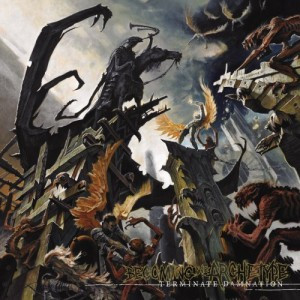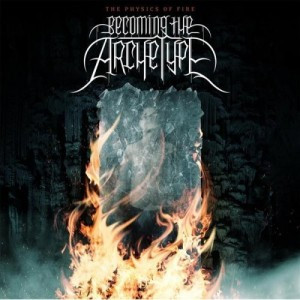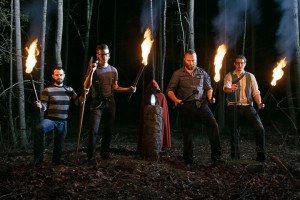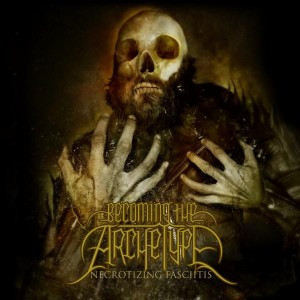
(Andy Synn is back with another SYNN REPORT. Today, the subject is Becoming the Archetype, and Andy discusses the band’s discography leading up to the newest release, Celestial Completion. Tomorrow we’ll have Andy’s review of that album.)
Becoming The Archetype, the four piece Progressive death metal band from Georgia, have gone through numerous line-up changes in their time, yet still consistently deliver vibrant, distinctive albums of stunning musicianship and complex compositions based around a core of crunching, shredding guitar, intricate, growling bass-lines, subtle yet dominating drums and the terrifying, lion-like roar of front-man Jason Wisdom.
Weaving in and out of this maelstrom of metallic might are the extra (yet never superfluous) elements which serve to add yet another string to the band’s progressive bow. Complex keys, piano and organ, transcendent clean singing, buzzing electronics, all tied together in a convoluted, genre-ambiguous package that at all times bleeds passion and sincerity.
With four albums under their belt so far, the band have carved themselves out a distinctive and instantly recognisable identity, despite the sheer variety of styles and approaches they employ. Terminate Damnation was their original exploration of controlled chaos and violent emotion, The Physics Of Fire” a labyrinthine mosaic of enigmatic musicianship and progressive drive, Dichotomy a cryptic synthesis of the band’s history and renewed aggression, with Celestial Completion a tangled yet profound fusion of old and new influences which opens up new doors for the band’s future. (more after the jump, including sample songs from each album . . .)
Terminate Damnation – 2005
 Following the keyboard-heavy introduction of “March Of The Dead”, the album kicks into gear with “Into Oblivion”, manically paced riffs and speedy drumming leading to a pounding, mid-paced crawl of controlled fury and twisting sequences of notes. The mid-section matches Opeth-ian grandeur and memorable, wandering bass-lines with harsh, razor-edged guitars and truly vicious vocals. The simple fragility of the clean sections is perfectly balanced by the impenetrable strength of the walls of distorted guitars.
Following the keyboard-heavy introduction of “March Of The Dead”, the album kicks into gear with “Into Oblivion”, manically paced riffs and speedy drumming leading to a pounding, mid-paced crawl of controlled fury and twisting sequences of notes. The mid-section matches Opeth-ian grandeur and memorable, wandering bass-lines with harsh, razor-edged guitars and truly vicious vocals. The simple fragility of the clean sections is perfectly balanced by the impenetrable strength of the walls of distorted guitars.
“One Man Parade” is a hellishly heavy beast of a song that features the unleashing of some truly demonic guttural vocals, adding to the more punishing and direct death metal flavour of the track. By contrast, the band’s epic ambitions are exposed on the 11:17 “Elegy”, a song split into several distinct, yet connected, movements; the first is a titanic swathe of thunderous drum beats and jagged riffs, which morphs into a morose piano led instrumental, before the third and final act builds upon these melodies with huge, bombastic guitars driving it toward its eventual conclusion.
“Night’s Sorrow” is a lengthy, complex instrumental of interweaving classical guitar lines, after which “The Epigone” commences an unrelenting assault of speedy riffs, violent drumming and roaring guttural vocals. Racing at full pelt toward the song’s mid-section, a short breather introduces a tense, edge-of-the-seat build up into a monolithic breakdown (of sorts) which is as damaging as it is interestingly written, dynamically employing a variety of metamorphosing riff and vocal arrangements to maintain the momentum and not get bogged down in over-indulgent cliché.
A series of stunning strikes to the heart and mind follow in the triple-threat of “Beyond Adaptation”, “No Fall Too Far” and “Ex Nihilo”. The former is a short, sharp storm of blazing guitars and violently drumming; “No Fall Too Far” a stately, and measured affair whose more grandiose tread befits the band’s monolithic intensity; and “Ex Nihilo” is a lithe, muscular creature, full of blazing lead parts, sudden time changes and animalistic, prowling menace.
The relatively simple and direct instrumental break of “Denouement” sets up album closer “The Trivial Paroxysm” to stun the listener with impressive finality. The cohesive structure of the song makes the digressions into clean guitar and piano-led beauty a beautiful and natural expression of the fiery experimental spirit of the band, much as it makes the apocalyptic fury of the death metal elements a reflection of their internal war of human frailty versus spiritual strength.
Summary: Overall their most obviously heavy album the album still has a fiery progressive spirit driving it. Yet even this only hints at the progression and experimentation which would follow!
Sample Song: Into Oblivion
The Physics Of Fire – 2007
 Far more progressive than their first record, The Physics Of Fire pushes the envelope further with smoother transitions between impressively complex arrangements, more manic yet fluid lead guitar work and an even greater disregard for conventional song structuring.
Far more progressive than their first record, The Physics Of Fire pushes the envelope further with smoother transitions between impressively complex arrangements, more manic yet fluid lead guitar work and an even greater disregard for conventional song structuring.
“Epoch Of War” commences with some subtle, baroque clean guitar work, its majestic intro soon superseded by some thrashy guitars and propulsive drumming. The vocals rage in a clear and powerful mid-range, ably supported by soaring cleans, while a warm bass tone underpins the melodic, shreddy (yet not overdone) guitar work. The juxtaposition of winding lead guitar and pummelling rhythmic playing in the outro manifests a smooth shift of gears into the speedy “Immolation”, whose more death metal inclined introduction belies the complex structuring that follows; prominent piano interludes, clean vocal-led sections and complex, neo-classical soloing all employed to break up and add further variety to the sequences of forceful riffing and rolling power.
With “Autopsy”, the band exploits its ability to fashion a keenly melodic riff without sacrificing death metal ferocity. The clean vocal interludes trade off with the menacing growls in an effective manner, even as the drums pound and blast away underneath. Killer solo too, all speedy finger-picking and bluesy melody, and massive ending, weirdly timed guitar and drums backing a powerful vocal refrain.
Following this with “The Great Fall”, the band once again ratchets up the intensity a few notches before breaking down into a series of almost randomly organised riffs and vocal patterns, whose structure takes a few listens to grasp fully. Easily the darkest song on the record, it conjures an oppressive, strangling sense of despair that fits the harsh keyboards and morose guitar leads like a glove.
Darkly melodic instrumental “Nocturne” effortlessly mixes the strains of classical piano with technically adept, clean guitar work, after which “Monolith” recalls both Opeth and Edge Of Sanity in its progressive scope. Heavy, but not limited, the song has broad horizons and an expansive structure, speedy and smooth at the same time, with precisely employed clean vocals and shredding leads.
 Following this with “Construct And Collapse” was a good move, the introductory organ refrain leading to a series of punchy, staccato riffs and furious blasting which up the aggression levels immediately. The constantly shifting structure allows the band to show off their flowing bass lines, tight guitar work and intricate, artful drumming to maximum effect.
Following this with “Construct And Collapse” was a good move, the introductory organ refrain leading to a series of punchy, staccato riffs and furious blasting which up the aggression levels immediately. The constantly shifting structure allows the band to show off their flowing bass lines, tight guitar work and intricate, artful drumming to maximum effect.
“Endure”, the shortest, most aggressive song on offer, is subtly oddly-timed, but performed in such a manner that this is difficult to notice, such is the natural way in which it is played. Fiery emotions run rampant throughout, in the scorching growls, wrathful drumming and particularly the manic soloing that crowns the song’s mid-point.
“Fire Made Flesh” is a more dynamic proposition, effortlessly switching styles and directions, speed and intentions, without losing its sense of identity. Distinctly jazzy playing adds flavour to the more extreme moments, while the guitars focus less on heaviness and more on depth and mid-paced, relentless power, using obtuse organisations of notes and odd chord patterns to hammer home the off-kilter force of the music.
With “Second Death” and “The Balance Of Eternity”, the album concludes with a progressive, ambitious pairing of lengthy songs full of complex riffs and time-changes. “Second Death” favours huge waves of melody that recall prime Extol, exploring a more organic flow of simple, yet abstract melodic themes. The song demonstrates masterful command of prog-inflected riffing, accented by dizzying fretboard gymnastics and moments of calm introspection.
After this, “The Balance Of Eternity” is perhaps the most singularly ambitious and challenging song on the record, a linear progression of intricate guitar work and propulsive drumming that manages to transform from a powerful stomp into a melancholy piano interlude, into a tech-death riff extravaganza, into a majestic and drawn out conclusion, without losing that consistent core of being that ties it all together as a cohesive whole.
Summary: Extensive and wide-ranging in ambition, far more intricate, with more demanding guitar work and more precise structuring, this album stands as a more complex, but less overtly chaotic piece of work than their debut. The inventive application of new, often enigmatic elements means the work is less heavy, but far more challenging than their debut.
Sample Song: Autopsy
Dichotomy – 2008
 With Dichotomy, Becoming The Archetype tackled the difficult task of both consolidating and progressing their sound. The loss of Alex Kenis (guitar/clean vocals) does add a limitation to their new sound, but otherwise the band continue to try different things and utilise new, varied elements. The songs are shorter, but the incorporation of new styles and elements is more concise and naturally integrated into their existing musical identity. As such the band has stretched themselves less on this release than on previous albums, but has taken greater care in attempting to integrate ALL the non-standard elements which they have previously toyed with.
With Dichotomy, Becoming The Archetype tackled the difficult task of both consolidating and progressing their sound. The loss of Alex Kenis (guitar/clean vocals) does add a limitation to their new sound, but otherwise the band continue to try different things and utilise new, varied elements. The songs are shorter, but the incorporation of new styles and elements is more concise and naturally integrated into their existing musical identity. As such the band has stretched themselves less on this release than on previous albums, but has taken greater care in attempting to integrate ALL the non-standard elements which they have previously toyed with.
“Mountain Of Souls” is a mid-paced crusher, showcasing the more coherent incorporation of prominent keyboard sections into the mountainous riffage, and is given a nice piece of melodic flavouring by the guest vocals of one Mr D. Townsend during its calming conclusion.
“Dichotomy” kicks off with a barking vocal refrain and a steady, galloping riff. Weaving in and out of a series of excellent, compelling riffs the song employs the guest vocal talents of Ryan Clark (Demon Hunter) to add a touch of melody to an otherwise direct and punchy metallic anthem.
“Artificial Immortality” builds on a backbone of memorable lead riffs and snappy drum parts, steadily increasing in heaviness to its blast-happy chorus, exploring the dichotomy of man vs machine. The extensive series of body punches and stunning uppercuts of the song’s latter half leaves the listener stunned and bloodied before “Self-Existent” kicks in with a bouncy piano intro which quickly transforms into a forceful display of barely restrained drumming and steadily ascending riffs, the band steadily increasing the sheer intensity of their delivery with every change and switch-up of their attack. The track errs on the side of blistering speed and pummelling fury, albeit with a clear thread of melody running through its core.
After the short, contemplative break of “St. Anne’s Lullaby”, the band hits hard with “Ransom” and “Evil Unseen”, two tracks of compact structure and lean, muscular riffage. The almost archaic introduction of “Ransom” makes the stomping, pounding ire of the track even more effective, its steady, bone-crushing grind made only more effective by the tiny injections of light and melody throughout.
 “Evil Unseen” is darker and more brooding in tone, with a more twisted use of dissonance and bleak keyboard sections. Marginally slower overall than its predecessor, the song still employs moments of blistering acceleration, shifting its momentum back and forth to leave the listener unsettled and on edge throughout.
“Evil Unseen” is darker and more brooding in tone, with a more twisted use of dissonance and bleak keyboard sections. Marginally slower overall than its predecessor, the song still employs moments of blistering acceleration, shifting its momentum back and forth to leave the listener unsettled and on edge throughout.
A triptych of particularly progressive tracks closes out the album. “How Great Thou Art” sees the band re-imagining a traditional hymnal as a flowing, melodic, storming monster of a metal track, swelling and rising with prodigious strength and surprising vigour.
The grooving, experimental “Deep Heaven” employs the talents of famous soprano Suzanne Richter, whispering piano trills, throbbing electronic sub-sections and artificial keyboard stabs to conjure an almost Cynic-al sense of futuristic style and bold substance amidst all the furious, staccato riffage and grooving drum rolls.
Closer “End Of An Age” tells perhaps the strongest and most potent story of the album, chugging brawn and vibrant, rumbling bass melding into an unstoppable steamroller of a track. Sinewy drum fills and vigorous kick patterns mix up the structure with their unpredictable designs and artillery-like deployment, while the vocals push themselves hard to express their unshakeable conviction through the medium of grand choral refrains and throat-rending screams. The song closes with a grand, epic fade-out of powerhouse riffing and emotive soloing.
Summary: A grand statement of intent and a consolidation of identity, that doesn’t stretch the band as much as on previous releases, but finds them more focussed and introverted, utilising the many tools at their disposal in a more deep and inventive manner. Although not as obviously ambitious, the record is still full of multi-faceted songs and sophisticated instrumental excursions.
Sample Song: Self Existent
Necrotizing Fasciitis – 2009
 As something of a stop-gap between albums, the band released this stand-alone digital single, a short, vicious shock of prodigious power and distorted vocals performed at stunning velocity. The band scales back the speed only once, in order to deliver a deep, sludgy assault of blunt force trauma, encouraging the listener to “embrace the plague”. Watch out for the snappy, dexterous ending as well.
As something of a stop-gap between albums, the band released this stand-alone digital single, a short, vicious shock of prodigious power and distorted vocals performed at stunning velocity. The band scales back the speed only once, in order to deliver a deep, sludgy assault of blunt force trauma, encouraging the listener to “embrace the plague”. Watch out for the snappy, dexterous ending as well.
Sample Song: Necrotizing Fasciitis
[audio:https://www.nocleansinging.com/wp-content/uploads/2011/04/01-Necrotizing-Fasciitis.mp3|titles=Becoming the Archetype – Necrotizing Fasciitis]Recommended For Fans Of: Extol, Edge Of Sanity, Borknagar

These guys are amazing, got into them with their Physics of Fire album. When you think you’ve got them all figured out, they turn around and stun you. I sure do miss Alex Kenis though. His other band Aletheian is a stunning one; almot like a blackened version of Death.
If I had to rank the albums in order of awesomeness it would probably be…
1) The Physics Of Fire
2) Terminate Damnation
3) Dichotomy
Not necessarily because any album is “better”, but because “Physcis…” is just massively ambitious and STILL manages to surprise me, while “Terminate…” still shocks me with new twists I’d forgotten about every time I go back to it. “Dichotomy” is far more cohesive and tightly written though. So they all offer something different.
I am a big fan of Aletheian too, “Dying Vine” is a massively under-rated album. I do think the cleans on the new record are better than Alex Kennis’ clean vocals though. His aren’t bad by any means, but the new ones are pretty stunning.